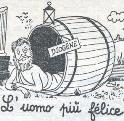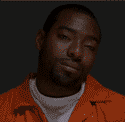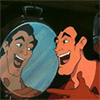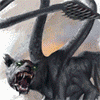|
Darth Walrus posted:He's calling him gay. But why quean instead of queen?
|
|
|
|

|
| # ? Apr 25, 2024 18:05 |
|
Darth Walrus posted:He's calling him gay. Remulak posted:But why quean instead of queen? They're homophones. e: and probably an anachronism on Frazer's part joat mon fucked around with this message at 19:10 on Apr 19, 2021 |
|
|
|
I thought this was an interesting passage in that the idea of efficiency and modernization is presented as a negative -- it's easy to think "great, one guy can do the work of ten" but then of course that means nine people are out of a job entirely. I remember reading about, oh, I think it was rubber farming along the Ivory Coast, and the colonizers came up to the natives and said "hey, come work for us and we can set up a modern rubber harvesting operation and make a lot of money," and the general consensus was "no thank you, we don't need the money, we've already got everything we need" -- because really, if you've got a little bit of land to grow crops and a house to keep the rain off your head, you can live a perfectly happy life! You don't NEED capitalism pressing everyone into working efficiently. (Of course, this ends with the colonizers setting up a ruling government and raising an army and forcing the locals to do their bidding under threat of violence, but what doesn't?) It reminds me a bit of modern automation -- we were all doing just fine beforehand, now in the name of progress we can automate half of three people's jobs, fire two of them, and tell the third guy he needs to do the remaining 1.5 people's worth of work. Great, I guess, if you're the guy who just cut his labor costs in half, but it's of dubious benefit to the overall community.
|
|
|
|
quote:As soon as the words were out, I saw I'd put my foot in it. The swing stopped abruptly, and she sat upright, with a face like a mask, staring at me. Ohhh poo poo. quote:Well, I could grovel, or face it out but I don't hold with grovelling to pretty women, not unless the danger's desperate or I'm short of cash. So I started to hum and haw placatingly, while she snapped in a voice like ice: She's clearly playing the long game but you can wonder if letting him-know-she-knows-he-knows helped her beyond that first meeting. It did help Flashman slither into a comfortable role quickly enough. quote:Altogether it was a rum game in those first few days rum for her, because she was a fair natural tyrant, yet whenever a disagreement in our discussions arose, she would allow it to smooth over, with that warm mysterious smile, and rum for me, because here I was day after day closeted with this choice piece of rump, and not so much as touching her, let alone squeezing and grappling. But I had to bide my time, and since she took such obvious and natural pleasure in my company, I contained my horniness for the moment, in the interests of diplomacy.  A dish that brings together pivotal places for Flashman. A dish that brings together pivotal places for Flashman. quote:It was all so comfy and easy, it might have been a dinner-party at home, except for the black faces and gleaming eyes of the bearers standing silent against the chick-screens, and the big moths fluttering round the lamps; afterwards there was a silly card game, and Truth or Con-sequences, and local scandal, and talk of leave and game-shooting with our cheroots and port on the verandah. Trivial enough memories, when you think what happened to all of them I can still feel the younger Wilton chit pulling at my arm and crying: Particularly in this book Fraser excels at clearly showing the world before it hit's the fan. quote:But her great delight was to be out of doors, riding or playing with her adopted son Damodar, a grave-faced imp of eight, or inspecting her guards at field exercise; she even watched their wrestling-matches in the courtyard, and a race-meeting in which some of our garrison officers took part I was intrigued to see that on this occasion she wore a purdah veil and an enveloping robe, for about the palace she went bare-faced and pretty bare-bodied, too. And if she could be as formal as a stockbroker with a new-bought peerage, she had a delightful way with the ordinary folk she was never so gay and happy as when she held a party for children from the city in her garden, letting them run among the birds and monkeys, and at one of her almsgivings I saw her quite concerned as her treasurer scattered coins among the mob of hideous and stinking beggars clamouring at her gate. Not at all like a Rani, sometimes she was a queer mixture of schoolgirl and sophisticated woman, all scatter one moment, all languor and dignity the next. Damned unpredictable oh, and captivating; there were times when even I found myself regarding her with an interest that wasn't more than four-fifths lustful and that ain't like me. It was directly after that alms-giving, when we rode out to her pavilion among the trees, and I had just, remarked that what was needed for India was a Poor Law and a few parish workuses, that she suddenly turned in her saddle, and burst out: The poor being used to score points by two people who'd never willingly give them a second thought is a hilarious undercurrent. quote:"Well, that doesn't leave 'em far behind the average Englishman," says I. "But it's fair law and with respect that's more than you can say for most of your Indian courts. Look now when there was a brawl in the street outside your palace two days since, what happened? Your guards didn't catch the culprits so they laid hands on the first poor soul they met, haled him into your divan, guilty or not and you have him hanging by his thumbs and sun-drying at the scene of the crime for two solid days. Fellow near died of it and he'd done nothing! I ask you, ma'am, is that justice?" Through Flashman's cynicism these books give readers the feeling that they are 'in the know', that here's a peek behind the curtain of the great and good of the day as they truly were, and it's certainly part of the appeal. A little like Procopius' Secret History of Justinian. Or those sexploitation books about Beijing's leaders that were all the rage in Hong Kong. Then, in the concluding notes of this book Fraser hits you again by showing where Flashman himself was almost certianly fooled, giving readers a double shot of it on their second read. Arbite fucked around with this message at 20:17 on Apr 22, 2021 |
|
|
|
Phenotype posted:It reminds me a bit of modern automation -- we were all doing just fine beforehand, now in the name of progress we can automate half of three people's jobs, fire two of them, and tell the third guy he needs to do the remaining 1.5 people's worth of work. Great, I guess, if you're the guy who just cut his labor costs in half, but it's of dubious benefit to the overall community. https://harpers.org/archive/1932/10/in-praise-of-idleness/ Arbite posted:Caine was my gateway to 40k and I'd recommend the first trilogy any day, but the series suffers over time from too many Tyranids in lieu of personalities and the comedy being increasingly tamped down.
|
|
|
|
Xander77 posted:My opinion exactly. By the end, I felt like the author was genuinely loving with me, presenting an interesting scenario, and then... nope, Tyranids all along. Ugh, I know. Imigine if The Greater Good had been Cain doing with the Tau what Flashman does with the Sikh Khalsa Army in Mountain of Light. That would have been good reading. Instead we got a cameo at the start, a cameo at the end, and nuthin but 'nids in the middle. But yeah, first trilogy's a must read (or better, listen), second trilogy's also pretty good. Just leave him in retirement after that. Also: Forums are back, let's get this show on the road.
|
|
|
|
quote:I was astonished; I'd never been in doubt that under the delectable feminine surface there was a tigress of sorts, but I hadn't thought it was such a passionately sentimental animal. D'you know, for a moment I was almost moved, she seemed such a damned spunky little woman; I felt like saying "There, there", or stroking her hand, or squeezing her tits, or something and then she had taken a breath, and sat upright in the saddle, as though recovering herself, and she looked so damned royal and so damned lovely that I couldn't help myself. I'll get back to this idea of traveling to London in person later but Flashman certainly seemed convinced it would work. The book doesn't do much more with it. quote:I sensed there was something up as soon as I presented myself in the durbar room; she was perfectly pleasant, vivacious even, as she told me about some new hunting-cheetah she'd been given, but her vakeel and chief minister weren't meeting her eye, and her foot was tap-tapping under the edge of her gold sari; ah, thinks I, someone's been getting the sharp side of missy's tongue. She didn't have much mind to business, either, and once or twice I caught her eyeing me almost warily, when she would smile quickly with anyone else I would have said it was nervousness. Finally she cut the discussion off abruptly, saying enough for today, and we would watch the guardsmen fencing in the courtyard. Well h's only got the one or two children, but quote:And then she had slipped from my arms and was walking quickly towards the door to her private room, with me grunting endearments in pursuit, but as I came after her she just raised a hand, without turning or breaking stride, and said firmly: Hoof, they're definitely close. quote:"You're mad," growls Ilderim. "Do you go alone where to?" Flashman's highs, lows, and sudden lurches from one to the next are magnificently executed throughout the book, especially at the end.
|
|
|
|
Arbite posted:
One thing about the books that the Lets Read format doesnt convey is that they have a *lot* of footnotes, ostensibly by a descendent of Flashman who found the manuscripts. They mostly give historical context or additional info, but the note on this section is different if I remember right. I remember it being the editor saying that he didnt think it actually happened this way, and that if it wasnt made up entirely then Lakshmi probably sent a palace woman instead. I thought it was interesting because I suspect Fraser didnt want to piss of India by depicting one of their figures from national mythology screwing around with a British guy.
|
|
|
|
It's been years since I read them, but aren't the footnotes supposed to be Fraser's own annotations to the original papers to add context,
|
|
|
|
Pretty sure the footnotes are supposed to be Fraser's. He does mention that he thinks that the some of the manuscripts were edited by an unknown descendant to censor swear words or to try to make Flashman not look as bad.
|
|
|
|
withak posted:He does mention that he thinks that the some of the manuscripts were edited by an unknown descendant to censor swear words or to try to make Flashman not look as bad. Harry mentions that his (legitimate) son Harry Jr. ends up becoming a bishop, so I think the assumption is that wee Havvy attempted to bowdlerize his dad's memoirs with an eye to publication sometime after Harry's death in 1915, but soon gave up on the project and locked the memoirs away in a chest that eventually wound its way into George MacDonald Fraser's hands in the late 1960s.
|
|
|
|
Marshal Radisic posted:Harry mentions that his (legitimate) son Harry Jr. ends up becoming a bishop, so I think the assumption is that wee Havvy attempted to bowdlerize his dad's memoirs with an eye to publication sometime after Harry's death in 1915, but soon gave up on the project and locked the memoirs away in a chest that eventually wound its way into George MacDonald Fraser's hands in the late 1960s. It definitely isn't Harry. I want to say it might have been one of Elspeth's sisters?
|
|
|
|
There's no way you could redact enough of Flashy's adventures for a bishop to publish...unless he was using it as material for a sermon on ...what would the sermon be on? Probably a lot of things. Although considering there's never any moral, I doubt anything would be taken.
|
|
|
|
Cobalt-60 posted:There's no way you could redact enough of Flashy's adventures for a bishop to publish...unless he was using it as material for a sermon on ...what would the sermon be on? Probably a lot of things. Although considering there's never any moral, I doubt anything would be taken.
|
|
|
|
Norwegian Rudo posted:It definitely isn't Harry. I want to say it might have been one of Elspeth's sisters? Y'all are right, the end-notes are supposed to be Fraser, but I got it mixed up with this - I remember that a couple of the manuscripts are "redacted" by somebody in the family. I think it was a young woman, because there's a footnote where Fraser points out that she redacted "d----d" or something like it but left some way worse word in and Fraser says he thinks she was innocent enough she didn't even realize that was a slur.
|
|
|
|
Another point, I've been pondering: if Flashman was virtuous, what would he actually do? His society defines virtue by Doing Your Part for the Team; decorum and ethics are the same. And Flashy rebels against that, but only when he finds it disadvantageous/painful/annoying to himself to play along. So he winds up doing the right thing for the wrong reasons, (or the wrong thing for the wrong reasons, often as not...)
|
|
|
|
Cobalt-60 posted:Another point, I've been pondering: if Flashman was virtuous, what would he actually do? The books do have a recurring character who is essentially a virtuous version of Flashman - his old schoolmate Scud East, who showed up in the Crimea and will show up again in the future. No points for guessing exactly what his upstanding Victorian character earns him in the end. A shallow grave in some miserable wasteland very, very far from home.
|
|
|
|
Also IIRC the bowdlerization of some of the Flashman Papers was supposedly done by Elspeth's sister Grizel. The way that words like "bloody" and "damned" were replaced with "b____y" and "d____d", but all the pornographic details of Flashman's amorous adventures were left intact led to an editor's note suggesting that Grizel may have been so dim and un-worldly that she didn't understand what was being described in those passages.
FMguru fucked around with this message at 00:18 on Apr 27, 2021 |
|
|
|
Yeah, he'd have been dead his first time out basically. For a guy of his social status in the era, he'd probably have been doing some form of colonial work though. Middle to upper class gentlemen were basically raised and indoctrinated to go out and support the Empire. I think it was mentioned in the analysis of the first book, but those public schools were basically factories for producing semi-expendable drones. I'd actually like to see an alternate universe Flashman where he got shunted into the political service instead of the military. To reference the Cain series, at one point he reminisces about what an idiot the administrator who decided he'd be trained as a commissar was, since Cain views himself as a self serving coward. The footnotes from the Inquisitor editing his manuscript notes that, to the contrary, the administrator must have been very forward thinking.
|
|
|
|
FMguru posted:One thing the books make quite clear is that if Harry was anything like the brave hero he is supposed to be, he'd be dead a thousand times over. He's alive because his first instinct to run away from trouble as fast as he can (without making it seem too obvious). I meant to say, what if Flashy actually wanted to do good. Being a Brave Hero is just playing for the team; it's the House Cup writ large and bloody. Flashman knows that the army is criminals, thugs, and schmucks, led by fools and morons, murdering others over which group of inbreds gets to loot which band of peasants. But he only cares because his personal fundament keeps getting in the fire. The closest thing to a virtuous act I can think of is him helping Cassie escape, and that was entirely because he needed her to get him out. Flashman but diplomatic corps; sounds like the Retief books by Keith Laumer.
|
|
|
|
Youve basically hit upon the fundamental irony that makes this series so delightful. Its a classic adventure story about the days of glory and empire, with a classic daring and dashing hero. Except that hes an awful, cowardly fraud and reveals the horrors and oppression and naked greed and savagery that the British empire consisted of. You have him win and succeed because he rejects and sees past the propaganda. It brings forward also the contradiction where a brave, noble hero would be just as ruthlessly savage and racist toward the foreign peoples hes oppressing, but you wouldnt notice it, because that hero wouldnt realize what an awful person he is
|
|
|
|
Cobalt-60 posted:Flashman but diplomatic corps; sounds like the Retief books by Keith Laumer. The Retief stories are pretty awesome and will probably appeal to most of the readers of this thread, have a couple of samples: https://www.baen.com/Chapters/0671318578/0671318578.htm
|
|
|
|
mllaneza posted:The Retief stories are pretty awesome and will probably appeal to most of the readers of this thread, have a couple of samples:
|
|
|
|
mllaneza posted:The Retief stories are pretty awesome and will probably appeal to most of the readers of this thread, have a couple of samples: This is really bizarre. I personally think the short story I read there was forgettable pulp, but the guy writing this foreword really, really likes the author. The political commentary and worldview has not aged well.
|
|
|
|
Genghis Cohen posted:The political commentary and worldview has not aged well. Baen.txt
|
|
|
|
quote:For perhaps ten seconds I lay motionless, gazing and then it rushed in on me that this wasn't a dream, that they were moving towards the couch, and that this was horrible, inexplicable danger. The net was gone from the couch, and I could see them clearly, the white eyes in the black faces I braced for an instant and then hurled myself off the couch away from them, slipped, recovered, and rushed at the shutters in the screen-wall. There was a snarl from behind me, something swished in the air and thudded, and I had a glimpse of a small pick-axe quivering in the shutter as I flung myself headlong at the screen, yelling in terror. Thank God I'm fourteen stone it came down with a splintering crash, and I was sprawling on the little verandah, thrashing my way out of the splintered tangle and heaving myself on to the verandah rail. https://www.youtube.com/watch?v=8_CTypOfEzw Yeah, that's about right. quote:oh, Jesus, my sight was going, my head was coming off, with a horrible pain tearing in my throat, I was dying even as I fell, floating down to the turf and then I was on my back, gasping down huge gulps of air, and the faces that were swimming in front of my eyes, glaring horribly, were merging into one Ilderim Khan was gripping my shoulders and urging: Thoroughly under her spell, even all these decades later. quote:I could even understand her slipping out and leaving me it had been a clandestine gallop, after all; she had a reputation to consider. What better way of concluding it than by vanishing swiftly back to the palace, leaving her partner to find his own way home I reflected moodily that she'd probably done the same thing, countless times, in that very pavilion, whenever she felt like it. She was no novice, that was certain no wonder her late husband had lost interest and curled up and died: the poor devil must have been worn to a shadow. Many times, in many ways, Fraser gets the reader to think 'Flashman doesn't deserve this.' quote:You'll wait a long time for it, my lad, thinks I; give me a good disguise and a pony and you'll not see me again not until everything has safely blown over, and some other idiot has disposed of Ignatieff and his bravos. That's when I'd emerge, with a good yarn to spin to Calcutta (and Pam) about how I'd gone after him secretly, and dammit, I'd missed the blighter, bad luck. That would serve, and sound sufficiently mysterious and convincing but for the moment my urgent need was a disguise and a hiding-place at a safe distance. Some jungly or desert spot might be best; I'd lived rough that way before, and as I'd told Ilderim, I could pass as a frontiersman or Afghan with any of 'em. The footnotes say Flashman must have artifically darkened his features somehow though he nevers mentions the method. And now, having explored the pre-war situation from the British perspective we are about to get another.
|
|
|
|
Re: skin staining Walnut juice, maybe? Iirc it was used in Hollywood to keep black horses looking black when they faded to brown in the sun
|
|
|
|
quote:You might think it impossible for a white man to pass himself off as a native soldier in John Company's army, and indeed I doubt if anyone else has ever done it. But when you've been called on to play as many parts as I have, it's a bagatelle. Why, I've been a Danish prince, a Texas slave-dealer, an Arab sheik, a Cheyenne Dog Soldier, and a Yankee navy lieutenant in my time, among other things, and none of 'em was as hard to sustain as my lifetime's impersonation of a British officer and gentleman. The truth is we all live under false pretences much of the time; you just have to put on a bold front and brazen it through. Just as perceptive as his cousin, then. quote:He'd spotted me for an old soldier, you see, which was all to the good; having detected me in a small deception, it never occurred to him to look for a large one. And he must have passed on his conclusion to the Colonel, for when I made my salaam to that worthy officer on the orderly-room verandah, he looked me up and down and says to the woordy-major in English: Getting comfortable and falling on his face again. quote:"Who taught you that?" says he. "And who bade you handle it, jangli pig? It is for you to see you touch it only when it is issued on parade." And he snatched it back from me. I thought another touch of character would do no harm, so I waited till he had waddled away to replace it in the rack, and then whipped out my Khyber knife and let it fly, intending to plant it in the wall a foot or so away from him. My aim was off though the knife imbedded itself in the wall all right, but it nicked his arm in passing, and he squealed and rolled on the floor, clutching at his blood-smeared sleeve. The way Fraser uses the light tension of being discovered at any moment to keep interest while teaching the reader about life as a native soldier works pretty drat well. quote:It wasn't easy, for a while; quite apart from remembering obeisances at the prescribed times, and making a show at cooking my own dinner at the choola, there were a thousand tiny details to beware of I must remember not to cross my legs when sitting, or blow my nose like a European, or say "Mmh?" if someone said something I couldn't catch, or use the wrong hand, or clear my throat in the discreet British fashion, or do any of the things that would have looked damned odd in an Afghan frontiersman. Bang! 'Oh right, he's terrible' It's quite the triumph how many times the books go out of their way to remind you of that without it ever getting old. quote:but when you're closed into a world whose four corners are the barrack-room, the choola, the stables, and the maidan, it can become maddening to have to endure the society of an inferior and foreign race with whom you've no more in common than if they were Russian moujiks or Irish bog-trotters. What makes it ten times worse is the outcast feeling that comes of knowing that within a mile or two your own kind are enjoying all the home comforts, drat 'em drinking under-officer barra pegs, smoking decent cigars, flirting and ramming with white women, and eating ices for dessert. (I was no longer so enamoured of mutton pilau in ghee, you gather.) Within a fortnight I'd have given anything to join an English conversation again, instead of listening to Pir Ali giggling about how he'd bullocked the headman's wife on his last leave, or the endless details of Sita Gopal's uncle's law-suit, or Ram Mangal's reviling of the havildar, or Gobinda Dal's whining about how he and his brothers, being soldiers, had lost much of the petty local influence they'd formerly enjoyed in their Oudh village, now that the Sirkar had taken over. And on that off putting comparison let's call it there today. From now on we will see many firsthand examples of how the British through stupidity, stubbornness, and laxity took discontent and made it explode. Arbite fucked around with this message at 02:30 on May 4, 2021 |
|
|
|
quote:"I shall go to the Colonel sahib!" says he finally, and one of the Hindoos, Gobinda Dal, sneered: Discontent and rumor-mongering spinning into violence is nothing new. quote:"They say!" cries Ram Mangal. "It is like the tale they put about that all the grease was mutton-fat if that were so, where is the need for anyone to make his own grease? It is a lie just as the Enlistment Act is a lie, when they said it was a provision only, and no one would be asked to do foreign service. Ask the 19th at Behrampore where their officers told them they must serve in Burma if they refused the cartridge when it was issued! Aye, but they will refuse then we'll see!" He waved his hands in passion. "The polluted atta is another link in the chain like the preaching of that owl Reynolds sahib with his Jesus-talk, which Carmik-al-Ismeet permits to our offence. He wants to put us to shame!" Never one to get distracted by men from what's important. quote:"They would have died before they would have put dishonour on their sepoys; their children, they used to call us, and we would have followed them to hell! But now," he wagged his head again, "these are cutch-sahibs, not pakka-sahibs and the English common soldiers are no better. Why, in my young day, an English trooper would call me brother, give me his hand, offer me his water-bottle (not realising that I could not take it, you understand). And now these common men spit on us, call us monkeys and hubshis and break Lal's string!" Flashman talked earlier about how since India had become a destination posting everything had worsened. quote:I got first-hand evidence of this a day or two later, when I accidentally jostled a Dragoon in the bazaar, and the brute turned straight round and lashed out with his boot. Somewhat like the description of the filled slave ship, Fraser gives the audience full view of what it's like before having Flashman remind us that he doesn't much mind when it's not happening to him or in his sight. quote:I doubt if any commander in the old days would have done what Carmichael-Smith did in the way of preaching-parades, either. I hadn't believed it in the barrack gossip, but sure enough, the next Sunday this coffin-faced Anglican fakir, the Rev. Reynolds, had a muster on the maidan, and we had to listen to him expounding the Parable of the Prodigal Son, if you please. He did it through a brazen-lunged rissaldar who interpreted for him, and you never heard the like. Reynolds lined it out in English, from the Bible, and the rissaldar stood there with his staff under his arm, at attention, with his whiskers bristling, bawling his own translation: Oh boy, this is one of my favourite passages in the series: quote:"There was a zamindar, with two sons. He was a mad zamindar, for while he yet lived he gave to the younger his portion of the inheritance. Doubtless he raised it from a moneylender. And the younger spent it all whoring in the bazaar, and drinking sherab. And when his money was gone he returned home, and his father ran to meet him, for he was pleased God alone knows why. And in his foolishness, the father slew his only cow he was evidently not a Hindoo and they feasted on it. And the older son, who had been dutiful and stayed at home, was jealous, I cannot tell for what reason, unless the cow was to have been part of his inheritance. But his father, who did not like him, rebuked the older son. This story was told by Jesus the Jew, and if you believe it you will not go to Paradise, but instead will sit on the right-hand side of the English Lord God Sahib who lives in Calcutta. And there you will play musical instruments, by order of the Sirkar. Parade dismiss!"
|
|
|
|
That is a phenomenal translation.
|
|
|
|
quote:I don't know when I've been more embarrassed on behalf of my church and country. I'm as religious as the next man which is to say I'll keep in with the local parson for form's sake and read the lessons on feast-days because my tenants expect it, but I've never been fool enough to confuse religion with belief in God. That's where so many clergymen, like the unspeakable Reynolds, go wrong and it makes 'em arrogant, and totally blind to the harm they may be doing. This idiot was so drunk with testaments that he couldn't conceive how ill-mannered and offensive he was making himself look; I suppose he thought of high-caste Hindoos as being like wilful children or drunken costermongers perverse and misguided, but ripe for salvation if he just pointed 'em the way. He stood there, with his unctuous fat face and piggy eyes, blessing us soapily, while the Muslims, being worldly in their worship, tried not to laugh, and the Hindoos fairly seethed. I'd have found it amusing enough, I dare say, if I hadn't been irritated by the thought that these irresponsible Christian zealots were only making things harder for the Army and Company, who had important work to do. It was all so foolish and unnecessary the heathen creeds, for all their nonsensical mumbo jumbo, were as good as any for keeping the rabble in order, and what else is religion for? Clearsighted as ever. quote:In any event, this misguided attempt to cure Hindoo souls took place, not just at Meerut but elsewhere, according to the religious intoxication of the local commanders, and in my opinion was the most important cause of the mischief that followed. I didn't appreciate this at the time and couldn't have done anything if I had. Besides, I had more important matters to engage my attention. If there's one criticism I have of this section it's that it repeatedly goes over how Flashman's not convincing anyone he has no military bearing only to have all parties immidiately dismiss the importance of that. quote:Hollo, thinks I, has he spotted something? But I couldn't think I'd done anything to give myself away until next morning, when the rissaldar called me out of the ranks, and told me to report to Mason's office in the British lines forthwith. I went with my heart in my mouth, wondering what the hell I was going to do if he had seen through my disguise, only to find it was the last thing my guilty conscience might have suspected. Got 'em. quote:"I guessed you understood English when the commander and your Colonel were talking in front of you yesterday," says he. "You couldn't keep it out of your eyes. Well, never mind; it's all to the good. But see here, Makarram Khan whatever you've done, whatever you've been, where's the sense in burying yourself in the ranks of a native cavalry pultan? You've got education and experience; why not use 'em? How long will it take you to make subedar, or havildar even, in your present situation? Twenty years, thirty with down-country cavalry? I'll tell you what you can do better than that." The wealth of perspectives is one of this books strongest suits. We saw basic barrack life as a sepoy, and now we get to view life as a more direct servant of the British. quote:Which I'm bound to say we did mind you, our association wasn't a long one, but while it lasted I thoroughly enjoyed myself, playing major-domo in his household, for that's what it amounted to, as I soon discovered. His bungalow was a pretty big establishment, you see, just off the east end of the Mall, near the British infantry lines, with about thirty servants, and since there was no proper mem-sahib, and his khansamah was almost senile, there was no order about the place at all. Rather than have me spend my time dogging him about his office, where there wasn't much for me to do except stand looking grim and impressive, Duff Mason decided I should make a beginning by putting his house and its staff into pukka order (as I gathered Ayub Jan had done in his time) and I set about it. Flashy, Jack-of-all-trades, you see: in the space of a few months I'd already been a gentleman of leisure, staff officer, secret political agent, ambassador, and sepoy, so why not a n***** butler for a change? And with this delightful acquaintance about to be made, let's call it there.
|
|
|
|
In case you are thinking flashies impersonation is completely absurd, check out Richard Burtons story, on whom I'd say a degree of Flashmans character comes. He disguised himself as a Pathan and traveled to Mecca among many other adventures.
|
|
|
|
sebmojo posted:In case you are thinking flashies impersonation is completely absurd, check out Richard Burtons story, on whom I'd say a degree of Flashmans character comes. He disguised himself as a Pathan and traveled to Mecca among many other adventures. Wow, that guy led an extraordinary life.
|
|
|
|
Flashman namedrops him at some point but when never see them meet.
|
|
|
|
How are u posted:Wow, that guy led an extraordinary life. Wait until we meet Josiah Harlan.
|
|
|
|
Flashy posted:(Between ourselves, I've a notion that had I been born in a lower station in life I'd have made a damned fine butler for some club or Town house, yes-me-lording the Quality, ordering flunkeys about, putting upstarts in their place, and pinching the port and cigars with the best of them.) I can just imagine him as a Blackadder-the-Third-alike.
|
|
|
|
sebmojo posted:In case you are thinking flashies impersonation is completely absurd, check out Richard Burtons story, on whom I'd say a degree of Flashmans character comes. He disguised himself as a Pathan and traveled to Mecca among many other adventures. This guy, who has mostly been forgotten by history, did it (traveling to Mecca) first: https://en.wikipedia.org/wiki/Georg_August_Wallin The English version of his page is almost criminally short and sparse in details though. Warden fucked around with this message at 14:17 on May 5, 2021 |
|
|
|
quote:"Now then, Makarram Khan, this is what you'll do," says she. "This house is a positive disgrace; you'll make it what it should be the best in the garrison after General Hewitt's, mind that. Ye can begin by thrashing every servant in the place and if you're wise you'll do it regularly. My father," says she, "believed in flogging servants every second day, after breakfast. So now. Have you the slightest the slightest notion of how such an establishment as this should be run? I don't suppose ye have." Some might criticize the book for taking a while to get to the action. gently caress'em. quote:So a few more weeks went by, and I was slipping into this nice easy life, as is my habit whenever things are quiet. I reckoned I'd give it another month or so, and then slide out one fine night for Jhansi, where I'd surprise Skene by turning up a la Pathan and pitch him the tale about how I'd been pursuing Ignatieff in secret and getting nowhere. I'd see Ilderim, too, and find if the Thugs were still out for me; if it seemed safe I'd shave, become Flashy again, and make tracks for Calcutta, protesting that I'd done all that could be done. Might even pay my respects to Lakshmibai on the way however, in the meantime I'd carry on as I was, eating Duff Mason's rations, seeing that his bearer laid out his kit, harrying his servants, and tupping his kitchen-maid she was a poor substitute for my Rani, and once or twice, when it seemed to me that Mrs Leslie's eye lingered warmly on my upstanding Pathan figure or my swarthy bearded countenance, I toyed with the idea of having a clutch at her. Better not, though too many prying eyes in a bungalow household, which is what made life hard for grass widows and unattached white females in Indian garrisons they couldn't do more than flirt in safety. Yes the man's an agitator but he's given so much to work with. Read the first excerpt again. Oh, absolutely everyone's having a grand old time, right? quote:I didn't value this, at the time, but it crossed my mind again a couple of nights later, when Duff Mason had Archdale Wilson, the binky-nabob, and Hewitt and Carmichael-Smith and a few others on his verandah, and I heard Jack Waterfield, a senior man in the 3rd Native Cavalry, talking about Behrampore, and wondering if it was wise to press ahead with the issue of the new cartridge. Flashman dies in 1915 and how conditions changed from just 1857 until then just in India could fill volumes. The largest immediate change in terms of administration will be touched on later in this and other books. quote:In the meantime, I had other things to claim my attention: Mrs Leslie of the red hair and lazy disposition had begun to take a closer interest in me. It started with little errands and tasks that put me in her company, then came her request to Duff Mason that I should ride escort on her and Miss Blanche when they drove out visiting ("it looks so much better to have Makarram Khan attending us than an ordinary syce"), and fmally I found myself accompanying her when she went riding alone the excuse was that it was convenient to her to have an attendant who spoke English, and could answer her questions about India, in which she professed a great interest. And on that ominous note, let's call it.
|
|
|
|
quote:For by now April had turned into May, the temperature was sweltering, and there was a hot wind blowing across the Meerut parade-ground and barracks that had nothing to do with the weather. You could feel the tension in the air like an electric cloud; the sepoys of the 3rd N.C. went about their drill like sullen automatons, the native officers stopped looking their men in the eye, the British officers were quiet and wary or explosively short-tempered, and there were more men on report than anyone could remember. There were ugly rumours and portents: the 34th N.I. the executed Sepoy Pandy's regiment had been disbanded at Barrackpore, a mysterious fakir on an elephant had appeared in Meerut bazaar predicting that the wrath of Kali was about to fall on the British, chapattis were said to be passing in some barrack-rooms, the Plassey legend was circulated again. Out of all the grievances and mistrust that folk like Ram Mangal had been voicing, a great, discontented unease grew in those few weeks and one thing suddenly became known throughout the Meerut garrison: without a word said, the certainty was there. When the new greased cartridge was issued, the 3rd Native Cavalry would refuse it. Still a maxim to this day and with drat good reason. quote:And if you'd fallen in with the skirmishers that fine morning, having seen the sullen faces as they put on their belts and bandoliers and drew their Enfields from the armoury, you'd not have wagered a quid to a hundred on their taking the cartridge. But Carmichael-Smith, the rear end, was determined, so there we stood, in extended line between the other squadrons of the regiment facing inwards, the native officers at ease before their respective troops, and the rissaldar calling us to attention as Carmichael-Smith, looking thunderous, rode up and saluted. And we're off. quote:Suddenly, Carmichael-Smith broke silence; his temper must have boiled higher with each refusal. Oh for gently caress's sake. quote:I tore it across with a shaky hand, poured the powder into the barrel, stuffed the cartridge after it, and rammed it down. Then I returned to attention, waiting. One of the more useless and self-defeating examples of British conduct in the series, and it's about to get worse. quote:So there it was. Carmichael-Smith could hardly talk for sheer fury, but he cussed us something primitive, promising dire retribution, and then dismissed the parade. They went in silence some stony-faced, others troubled, a number (like old Sardul) weeping openly, but mostly just sullen. For those of us who had taken the cartridges, by the way, there were no reproaches from the others proper lot of long-suffering holy little Tom Browns they were. And then, quote:I can't say I had much sympathy with 'em anyone who's fool enough to invite ten years on the rock-pile for his superstitions deserves all he gets, in my view. But I'm bound to say that once the sentence had been passed, it couldn't have been worse carried out instead of shipping the eighty-five quietly off to jail the buffoon Hewitt decided to Iet the world and other sepoys especially see what happened to mutineers, and so a great punishment parade was ordered for the following Saturday.
|
|
|
|

|
| # ? Apr 25, 2024 18:05 |
|
quote:With all this, I'd soon forgotten about the punishment parade, until after dinner, when Duff .Mason and Carmichael-Smith and Archdale Wilson had taken their pegs and cheroots on to the verandah, and I heard Smith's voice suddenly raised unusually loud. I stopped a matey who was taking out a tray to them, and took it myself, so I was just in time to hear Smith saying: And the man lived to be 93. quote:...and we rode out again to Aligaut. She was in the cheeriest spirits, curse her, climbing all over me as soon as we reached the temple, and by the end of the afternoon I was beginning to wonder how much more Hindoo culture I could endure, delightful though it was. I was a sore and weary native orderly by the time we set off back, and dozing pleasantly in my saddle as we passed through the little village which lies about a mile east of the British town indeed, I could just hear the distant chiming of the church bell for evening service when Mrs Leslie gave an exclamation and reined in her pony. And having written that last enjoyable jaunt for Flashman, Fraser begins to tell of how the poo poo has hit the fan. quote:If I'd had my wits about me, or more than an inkling of what was happening, I'd have turned our ponies north and ridden for the safety of the British infantry lines a mile away. But my first thought was: Gough was right, some crazy bastards are rioting and trying to break the prisoners loose and of course they'll fail, because Hewitt'll have British troops marching down to the scene at once; maybe they're there already, cutting up the n******. I was right and wrong, you see, but above all I was curious, once my first qualms had settled. So it wasn't in any spirit of chivalry that I sang out to Mrs Leslie: The man knows how to write a chaotic scene. quote:It was the shocking unexpectedness of it that had unmanned me to see a white man torn to pieces by natives. Perhaps you can't imagine what that meant in India; it was something you could not believe, even when you saw it. For a few moments I must have ridden blind, for the next thing I knew I was reining up on the edge of the Grand Trunk where it comes north out of Meerut city, gazing at a huge rabble pouring up towards the British town; to my amazement half of them were sepoys, some of them just in their jackets, others in full fig down to the cross-belts, brandishing muskets and bayonets, and yelling in unison: "Mat Karo! Mat Karo!*(*"Kill!) Sipahi Jai!" and the like slogans of death and rebellion. There was one rascal on a cart, brandishing ankle-irons above his head, and a heaving mass of sepoys and bazaar-wallahs pushing his vehicle along, yelling like drunkards. With that near scrape let's call it for now. In the interest of not quadruple posting, let me ask you: We're halfway through the book and Flashman's given us at least five perspectives on life in the British Empire during this time. Up to this point, What do you think about this books portrayal of the events and people in the lead up to the Mutiny? Please contribute even if you haven't piped up in the thread yet. Also kindly don't spoil specific events that happen to Flashman later in this book, of course.
|
|
|









































